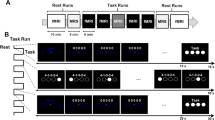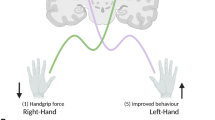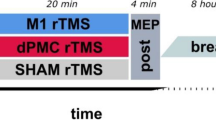Abstract
PERFORMANCE of complex motor tasks, such as rapid sequences of finger movements, can be improved in terms of speed and accuracy over several weeks by daily practice sessions. This improvement does not generalize to a matched sequence of identical component movements, nor to the contralateral hand. Here we report a study of the neural changes underlying this learning using functional magnetic resonance imaging (MRI) of local blood oxy-genation level-dependent (BOLD)1–4 signals evoked in primary motor cortex (Ml). Before training, a comparable extent of Ml was activated by both sequences. However, two ordering effects were observed: repeating a sequence within a brief time window initially resulted in a smaller area of activation (habituation), but later in a larger area of activation (enhancement), suggesting a switch in Ml processing mode within the first session (fast learning). By week 4 of training, concurrent with asymptotic performance, the extent of cortex activated by the practised sequence enlarged compared with the unpractised sequence, irrespective of order (slow learning). These changes persisted for several months. The results suggest a slowly evolving, long-term, experience-dependent reorganization of the adult Ml, which may underlie the acquisition and retention of the motor skill.
This is a preview of subscription content, access via your institution
Access options
Subscribe to this journal
Receive 51 print issues and online access
$199.00 per year
only $3.90 per issue
Buy this article
- Purchase on Springer Link
- Instant access to full article PDF
Prices may be subject to local taxes which are calculated during checkout
Similar content being viewed by others
References
Bandettini, P. A., Wong, E., C., Hinks, R. S., Tikofsky, R. S. & Hyde, J. S. Magn. Reson. Med. 25, 390–397 (1992).
Kim, S. G. et al. J. Neurophysiol. 69, 297–302 (1993).
Kwong, K. K. et al. Proc. natn. Acad. Sci. U.S.A. 89, 5675–5679 (1992).
Ogawa, S. et al. Proc. natn. Acad. Sci. U.S.A. 89, 5951–5955 (1992).
Sterling, M. K., Turner, R. & Mansfield, P. Science 254, 716–719 (1991).
Miller, E. K., Gochin, P. M. & Gross, C. G. Vis. Neurosci. 7, 357–362 (1991).
Warach, S. et al. J. cerebr. Blood Flow Metab. 12, 546–553 (1992).
Recanzone, G. H., Merzenich, M. M., Jenkins, W. M., Grajski, K. A. & Dinse, H. R. J. Neurophysiol. 67, 1031–1056 (1992).
Sanes, J. N., Wang, J. Donoghue, J. P. Cerebr. Cortex 2, 141–152 (1992).
Milliken, G. W., Nudo, R. J., Grenda, R., Jenkins, W. M. & Merzenich, M. M. Soc. Neurosci. Abstr. 18, 506 (1992).
Jacobs, K. M. & Donoghue, J. H. Science 251, 944–947 (1991).
Kami, A. & Sagi, D. Nature 365, 250–252 (1993).
Asanuma, H. & Keller, A. NeuroReport 2, 217–224 (1991).
Seitz, R. J. et al. NeuroReport 1, 57–66 (1990).
Friston, K. J., Frith, C. D., Passingham, R. E., Liddle, P. F. & Frackowiak, R. S. J. Proc. R. Soc. Lond. B 248, 223–228 (1992).
Jenkins, I. H., Brooks, D. J., Nixon, P. D., Frackowiak, R. S. J. & Passingham, R. E. J. Neurosci. 14, 3775–3790 (1994).
Schlaug, G., Knorr, U. & Seitz, R. J. Expl Brain Res. 98, 523–534 (1994).
Grafton, S. T. et al. J. Neurosci. 12, 2542–2548 (1992).
Kawashima, R., Roland, P. E. & O'Sullivan, B. T. J. Neurosci. 14, 3462–3474 (1994).
Pascual-Leone, A. et al. Neurology 43, A157 (1993).
Pascual-Leone, A., Grafman, J. & Hallett, M. Science 263, 1287–1289 (1994).
Mishkin, M., Malamut, B. & Bachevalier, J. in The Neurobiology of Learning and Memory (eds Lynch, G., McGaugh, J. L. & Weinberger, N. M.) 64–88 (Guilford, New York, 1984).
Le Bihan, D. et al. Proc. Soc. magn. Reson. Med. 1, 11 (1993).
Friston, K., Jezzard, P. & Turner, R. Hum. Brain Mapp. 1, 153–171 (1994).
Rademacher, J., Caviness, V. S., Steinmetz, H. & Galaburda, A. M. Cerebr. Cortex 3, 313–329 (1993).
Author information
Authors and Affiliations
Rights and permissions
About this article
Cite this article
Kami, A., Meyer, G., Jezzard, P. et al. Functional MRI evidence for adult motor cortex plasticity during motor skill learning. Nature 377, 155–158 (1995). https://doi.org/10.1038/377155a0
Received:
Accepted:
Issue Date:
DOI: https://doi.org/10.1038/377155a0
This article is cited by
-
Sequence-specific delayed gains in motor fluency evolve after movement observation training in the absence of early sleep
Scientific Reports (2024)
-
Motor learning- and consolidation-related resting state fast and slow brain dynamics across wake and sleep
Scientific Reports (2024)
-
Configuration and Force-field Aware Variable Impedance Control with Faster Re-learning
Journal of Intelligent & Robotic Systems (2024)
-
Noninvasive theta-burst stimulation of the human striatum enhances striatal activity and motor skill learning
Nature Neuroscience (2023)
-
Short-term balance consolidation relies on the primary motor cortex: a rTMS study
Scientific Reports (2023)
Comments
By submitting a comment you agree to abide by our Terms and Community Guidelines. If you find something abusive or that does not comply with our terms or guidelines please flag it as inappropriate.



